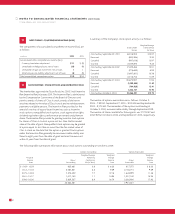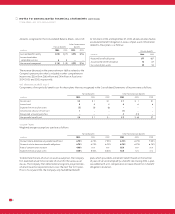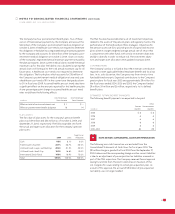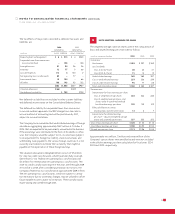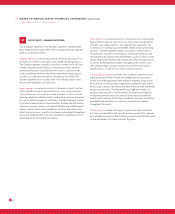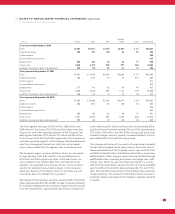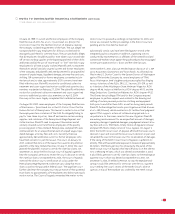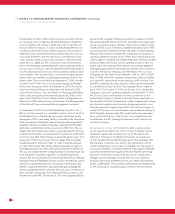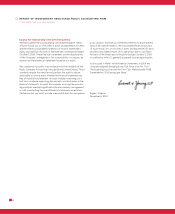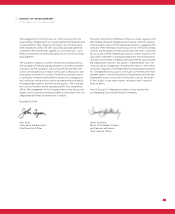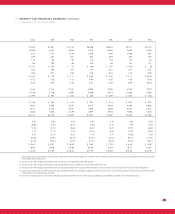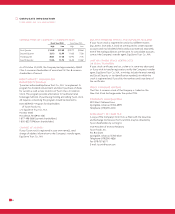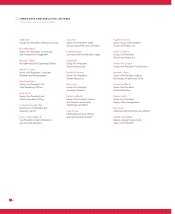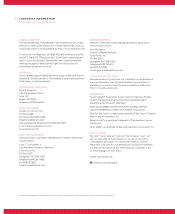Tyson Foods 2004 Annual Report Download - page 62
Download and view the complete annual report
Please find page 62 of the 2004 Tyson Foods annual report below. You can navigate through the pages in the report by either clicking on the pages listed below, or by using the keyword search tool below to find specific information within the annual report.
60
NOTES TO CONSOLIDATED FINANCIAL STATEMENTS (CONTINUED)
on December 10, 2003. A Petition for Certiorari was filed with the
U.S. Supreme Court on February 26, 2004. Briefing on the Petition
is now complete, and, on May 3, 2004, the Court invited the U.S.
Solicitor General to express its views on the pending Petition. On
October 25, 2004, the Solicitor filed its response which acknowl-
edged the issues warranted review but advised that a First Circuit
case would be better suited for the Court’s consideration of the
issues. Chavez initially was pursued as an opt-in, collective action
under 29 U.S.C. 216(b), but the U.S. District Court for the Eastern
District of Washington granted plaintiff’s motion seeking certifica-
tion of a class of opt-out, state law plaintiffs under Federal Rule of
Civil Procedure 23 and notice was sent to potential state law claim
class members. The state-law class is closed and contains approxi-
mately 3,900 class members, including approximately 1,200 on the
federal claim. The trial was held from September 7, 2004, through
October 4, 2004. The District Court issued its proposed findings
of fact and conclusions of law on December 8, 2004. The District
Court has informed the parties they have until January 13, 2005,
to provide the District Court with briefs on the proposed findings
of fact and conclusions of law and until January 28, 2005, to file
reply briefs. The District Court intends to hear oral arguments on
February 24, 2005, before issuing its final order. The damages phase
of the trial will then commence before a judgment is entered.
On November 21, 2002, a lawsuit entitled Emily D. Jordan, et al. v.
IBP, inc. and Tyson Foods, Inc., was filed in the U.S. District Court for
the Middle District of Tennessee. Ten current and former hourly
employees of TFM’s case-ready facility in Goodlettsville, Tennessee,
filed a complaint on behalf of themselves and other unspecified,
allegedly “similarly situated” employees, claiming that the defen-
dants have violated the overtime provisions of the FLSA. The suit
alleges that the Company has failed to pay employees for all hours
worked from the plant’s commencement of operations under TFM’s
control in April 2001. The Company acquired the plant as part of its
acquisition of TFM. In particular, the suit alleges that employees
should be paid for the time it takes to collect, assemble and put
on, take off and wash their health, safety and production gear at
the beginning and end of their shifts and during their meal period.
The suit also alleges that the Company deducts 30 minutes per day
from employees’ paychecks regardless of whether employees
obtain a full 30-minute period for their meal. Plaintiffs are seeking a
declaration that the defendants did not comply with the FLSA, and an
award for an unspecified amount of back pay compensation and
benefits, unpaid entitlements, liquidated damages, prejudgment
and post-judgment interest, attorney fees and costs. On January 10,
2003, another 31 employees from Tennessee filed consents to join
the lawsuit as plaintiffs. On January 15, 2003, the Company filed an
answer to the complaint denying any liability. On January 14, 2003,
the named plaintiffs filed a motion for expedited court-supervised
notice to prospective class members. The motion sought to condi-
tionally certify a class of similarly situated employees at all of TFM’s
non-union facilities that have not been the subject of FLSA litigation.
Plaintiffs then withdrew a request for conditional certification of
similarly situated employees at all of TFM’s non-union facilities and
rather sought to include all non-exempt employees that have worked
at the Goodlettsville facility since its opening on April 1, 2001. On
June 9, 2003, the Company filed a Motion for Summary Judgment
seeking the applicability of the injunction entered by the U.S. District
Court for the District of Kansas and affirmed by the U.S. Court
of Appeals for the Tenth Circuit (Metzler v. IBP, inc. 127 F. 3rd 959,
10th Cir. 1997), which the Company contends has a preclusive effect
as to plaintiffs’ claims based on pre- and post-shift activities. The
plaintiffs conducted discovery limited to that issue and responded
to said Motion on June 18, 2004. The Company filed its reply on
July 2, 2004. On October 12, 2004, the District Court denied the
Company’s motion for summary judgment. On November 17, 2003,
the District Court conditionally certified a collective action
composed of similarly situated current and former employees at
the Goodlettsville facility based upon clothes changing and washing
activities and unpaid production work during meal periods, since
the plant operations began in April 2001. Class Notices to approxi-
mately 4,500 prospective class members were mailed on January 21,
2004. Presently, approximately 525 current and former employees
have opted into the class. The District Court stayed discovery
on November 8, 2004, pending the Supreme Court’s decision on
certiorari in Alvarez.
On October 23, 2001, a putative class
action lawsuit was filed in the District Court for Mayes County,
Oklahoma, against the Company by R. Lynn Thompson and
Deborah S. Thompson on behalf of all owners of Grand Lake
O’ the Cherokee’s littoral (lakefront) property. The suit alleges that
the Company “or entities over which it has operational control”
conduct operations in such a way as to interfere with the putative
class action plaintiffs’ use and enjoyment of their property, allegedly
caused by diminished water quality in the lake. Plaintiffs are seeking
injunctive relief and an unspecified amount of compensatory
damages, punitive damages, attorney fees and costs. Simmons
Foods, Inc. (Simmons) and Peterson Farms, Inc. (Peterson) have been
joined as defendants. The Company and Simmons are seeking leave
to file a third party complaint against entities that contribute


